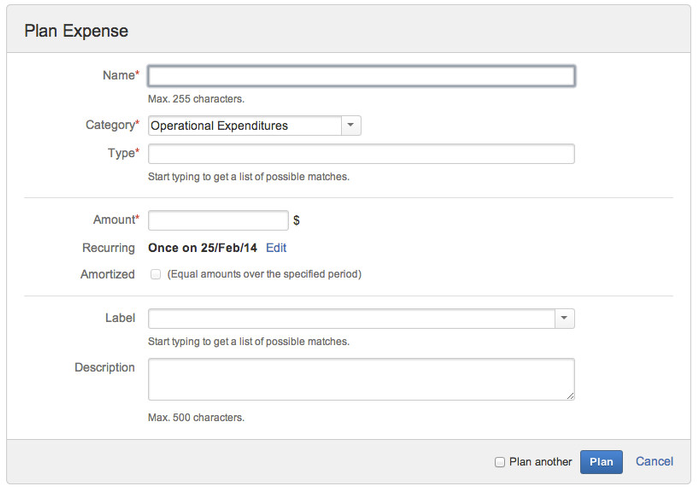The Planned Costs page allows you to enter all expenses and all team positions you expect the Folio will require during its lifespan. Expenses are added to one of three main categories: Operational expenditures (OPEX), Capital expenditures (CAPEX) or Financial expenditures (FINEX). Expenses can be single occurrence or recurrent ones. Positions are the team members you will need to accomplish the work, such as developers, testers, team leads, etc. and are added to the operational expenditures. Information entered here will be used to provide project health metrics on the Overview page and shown as a reference on the Costs Forecast chart. PositionsPositions are the salary expenses you plan the Folio will incur at one point or another. They are operational expenditures. Positions are grouped by title (e.g. Developer, Architect, Q&A). You can collapse (or expand) a group of positions by clicking the triangle icon ( ) next to a position title. Example of positions could be J2EE Developer 1, System Architect, Test Automation Specialist, etc. See the Positions page for more information on positions and how their cost is calculated. Planning an expenseTo add an expense, either click the Plan Expense button or hit the "a" (for add) shortcut key. This brings the expense edition dialog. Check the "Plan another" box at the bottom of the dialog in order to create many expenses in sequence.
Select an existing expense to modify by clicking on it and then either click on the drop-down menu on the top-right part of the expense details view (on righthand side of the screen) and select the Edit option or hit the "e" (for edit) shortcut key. This will bring up the expense edition dialog.
Deleting an expenseSelect an existing expense to delete by clicking on it and then either click on the ... menu on the top-right part of the details panel (on righthand side of the screen) and select the Delete option or hit the d (for delete) shortcut key. This brings up a dialog to confirm expense deletion. Click the Delete button to confirm the deletion, or Cancel link to abort. Deletion is permanent, thus make sure you really want to delete an expense before proceeding. You can delete multiple expenses (even a mix of expenses and positions) at once. Refer to the Multiple Selection to learn how to perform a batch deletion. Attaching files to an expenseYou can attach files to an expense in order to keep related documents handy (invoices, quotations, etc.). To attach files to an expense, select it and then click button Attach Files in expense details panel on the right. This will bring up a dialog where you can pick a file (or multiple files simultaneously, if your browser allows it) and enter an optional comment. Viewing Expense detailsWhen selecting an expense, more information on that expense is displayed in the details panel on the right. Note that you can also select multiple expenses (or even a mix of expenses and positions) at once by selecting multiple lines. This provides you an aggregated view showing the total cost associated with these expenditures.
Copying an expense to actualSelect an existing expense to copy to actual by clicking on it and then either click on the drop-down menu on the top-right part of the expense details view (on righthand side of the screen) and select the Copy to actual option or hit the "t" (for to Actual) shortcut key. This will copy the selected expense to actual, including its attached files. You can copy multiple expenses to actual at once by selecting them in the budget (by pressing and holding the Control key while clicking the expenses to copy). You can then copy the selected expenses the same way you copy a single expense. The confirmation message will inform you of how many expenses have been copied. Import / ExportFOLIO Allows you to import or export your data in CSV (comma separated values) format. Importing Planned ExpensesTo import data from an existing CSV file, click on the ... button and select Import data. Alternatively, you can type the keyboard shortcut i to open the import dialog. See Importing Data from CSV and Planned Costs Importing Tips to learn more about importing Planned expenses. Exporting Planned ExpensesTo export data to an external CSV file click on the ... button and select Export data. Alternatively, you can type the keyboard shortcut x to instantly export Planned Expenses. Exported CSV file includes both budgeted positions and expenses. See Planned Costs CSV Export Detail to learn more about Planned expenses export. Scope InspectorThe scope inspector allows you to view the breakdown of the Folio's scope by issue type (user stories, bugs, etc.) and see if the planned positions have a capacity that matches the effort required for that scope. It will help you answer questions such as:
Clicking the Scope button brings up that information in the details panel on the right.
| Related pages: | ||||||||||||||||||||||||||||||||||||||||||
This is the documentation for an older version of Folio and has been moved to the Tempo instance.
Please view the Folio Category in the Tempo Products Wiki Categories for all versions of Folio's Documentation.
General
Content
Integrations







